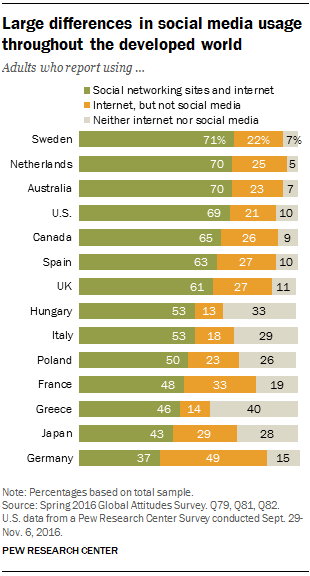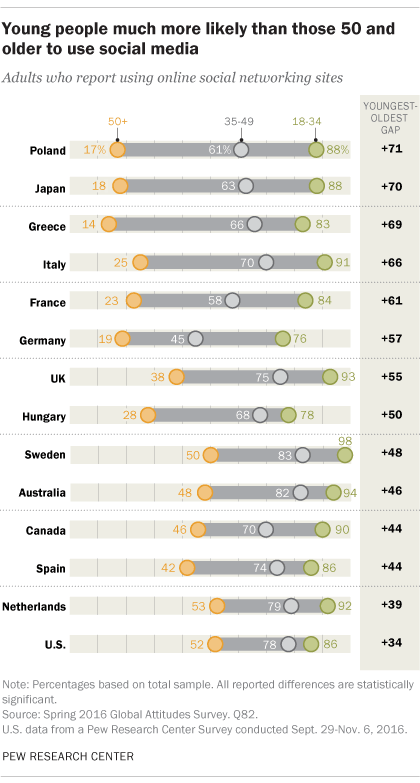
Despite the seeming ubiquity of social media platforms like Facebook and Twitter, many in Europe, the U.S., Canada, Australia and Japan do not report regularly visiting social media sites. But majorities in all of the 14 countries surveyed say they at least use the internet.
 Social media use is relatively common among people in Sweden, the Netherlands, Australia and the U.S. Around seven-in-ten report using social networking sites like Facebook and Twitter, but that still leaves a significant minority of the population in those countries (around 30%) who are non-users.
Social media use is relatively common among people in Sweden, the Netherlands, Australia and the U.S. Around seven-in-ten report using social networking sites like Facebook and Twitter, but that still leaves a significant minority of the population in those countries (around 30%) who are non-users.
At the other end of the spectrum, in France, only 48% say they use social networking sites. That figure is even lower in Greece (46%), Japan (43%) and Germany (37%). In Germany, this means that more than half of internet users say they do not use social media.
The differences in reported social media use across the 14 countries are due in part to whether people use the internet, since low rates of internet access limit the potential social media audience. While fewer than one-in-ten Dutch (5%), Swedes (7%) and Australians (7%) don’t access the internet or own a smartphone, that figure is 40% in Greece, 33% in Hungary and 29% in Italy.
 However, internet access doesn’t guarantee social media use. In Germany, for example, 85% of adults are online, but less than half of this group report using Facebook, Twitter or Xing. A similar pattern is seen in some of the other developed economies polled, including Japan and France, where social media use is low relative to overall internet penetration.
However, internet access doesn’t guarantee social media use. In Germany, for example, 85% of adults are online, but less than half of this group report using Facebook, Twitter or Xing. A similar pattern is seen in some of the other developed economies polled, including Japan and France, where social media use is low relative to overall internet penetration.
Across the 14 countries surveyed, a median of 57% say they visit social media sites, such as Facebook, Twitter and other country-specific sites (for full list, see appendix). But social media use is not equally widespread within each country. Generally, those who are younger, more educated and richer tend to be more likely to report using social media, even among internet users.
The age gap on social media use between 18- to 34-year-olds and those ages 50 and older is significant in every country surveyed. For example, 88% of Polish millennials report using social networking sites, compared with only 17% of Poles ages 50 and older, a 71-percentage-point gap.
Note: See here for topline results of our survey, a list of smartphone and social networking examples used in each country, and methodology.



